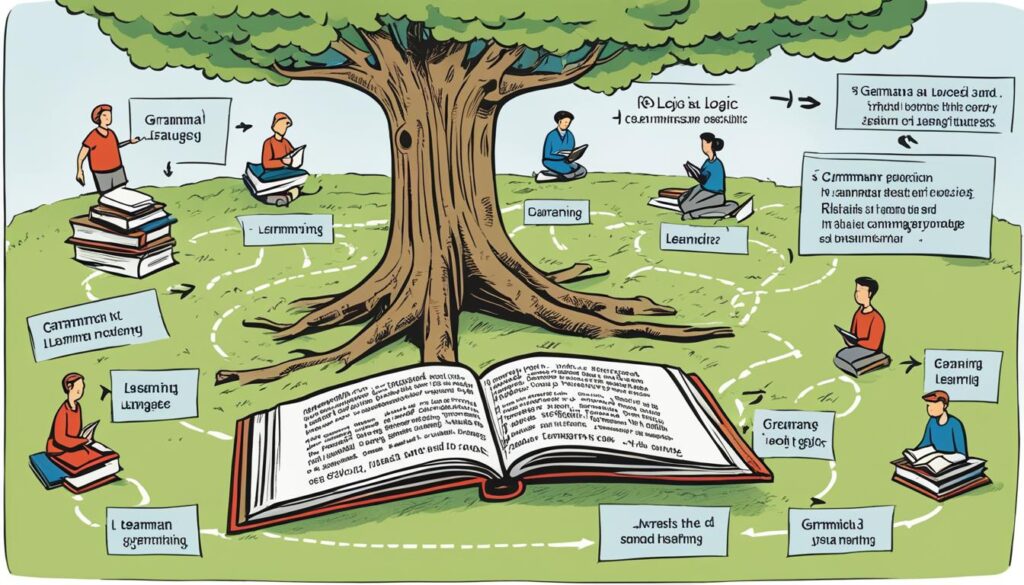If you have ever felt that your education was lacking in the classics, “The Well-Educated Mind” by Susan Wise Bauer is the book for you. Through her comprehensive guide, Bauer provides readers with the tools to achieve a classical education that can enhance personal growth and intellectual development. With a focus on self-enrichment and lifelong learning, this book is the perfect resource for individuals seeking to expand their knowledge beyond traditional education systems and discover the power of classical education.
Key Takeaways:
- Susan Wise Bauer’s “The Well-Educated Mind” is a comprehensive guide for achieving a classical education.
- The book focuses on self-enrichment and intellectual growth, emphasizing the importance of lifelong learning.
- A classical education provides individuals with a well-rounded education that fosters critical thinking and analytical skills.
- Implementing classical education in modern times is achievable through homeschooling, supplementary resources, and online learning.
- Expanding one’s knowledge beyond classical education is also essential, with recommendations including classical literature and philosophy.
Understanding Classical Education
Classical education is a teaching approach that has its roots in ancient Greece and Rome. It emphasizes the importance of knowledge for its own sake, as opposed to solely for practical application. This approach centers around the liberal arts, which include grammar, logic, rhetoric, arithmetic, geometry, music, and astronomy, and aims to train individuals to think critically, reason logically, and communicate effectively.
Compared to modern education systems, which prioritize STEM subjects and job-specific skills, classical education places a greater emphasis on traditional learning methods and the humanities. By focusing on the liberal arts, classical education seeks to provide individuals with a well-rounded education that prepares them for various aspects of life.
In the following table, we highlight the differences between classical education and the modern education system:
A Comparison of Classical Education and the Modern Education System
| Classical Education | Modern Education System |
|---|---|
| Emphasis on liberal arts | Emphasis on STEM subjects and job-specific skills |
| Focus on traditional learning methods | Emphasis on technology and digital learning platforms |
| Emphasis on critical thinking and reasoning skills | Emphasis on memorization and standardized testing |
| Teaches skills for lifelong learning and personal growth | Teaches skills for finding jobs and entering the workforce |
Overall, classical education is a comprehensive teaching approach that seeks to enrich individuals with knowledge, lifelong learning skills, and personal growth opportunities.
The Benefits of Classical Education
Classical education offers a plethora of benefits that extend beyond traditional learning. One of the most significant advantages of pursuing a classical education is the fostering of critical thinking and analytical skills. By emphasizing logic and reasoning, classical education prepares individuals to make informed decisions and judgments.
Furthermore, classical education provides individuals with a well-rounded education that prepares them for various aspects of life. Beyond academic subjects, it includes art, music, foreign languages, and physical education, providing a comprehensive approach to education.
Classical education cultivates an appreciation for lifelong learning and intellectual curiosity, promoting personal growth and development beyond the classroom setting. It equips individuals to think independently and approach challenges from a unique perspective, essential traits in a rapidly changing world.
Comparison table: Analytical & Critical Thinking Skills in Classical and Modern Education
| Classical Education | Modern Education | |
|---|---|---|
| Critical Thinking | Emphasizes critical thinking and questioning techniques to form and express opinions | Places less emphasis on critical thinking |
| Analytical Skills | Fosters analytical skills through the study of classical literature and philosophy, developing the capacity to analyze and comprehend concepts | Places less emphasis on analytical thinking |
| Well-rounded Education | Covers all aspects of education, including humanities, languages, math, science, and physical education, creating well-rounded individuals | Public schools teach for specific, exam-driven tests, focusing mainly on academic subjects that will enhance test scores and rankings |
A Guide to Self-Enrichment
To achieve a well-educated mind, personal development, lifelong learning, and nurturing intellectual curiosity are essential elements. According to Susan Wise Bauer, classical education provides a guide for self-enrichment. Her book, “The Well-Educated Mind,” outlines the importance of reading widely, gaining knowledge, and developing analytical skills through rigorous intellectual pursuits.
Bauer recommends setting aside time for reading, creating a reading list, and tracking progress to ensure consistent growth. She emphasizes the importance of critically analyzing texts, asking questions, and pursuing further research to expand upon knowledge gained through reading. With these practices, individuals can develop their analytical skills and gain a deeper understanding of topics of interest.
“A well-educated mind,” Bauer states, “is curious, reflective, and passionate about learning.”
Moreover, cultivating intellectual curiosity involves stepping outside of one’s typical intellectual comfort zone, exploring new fields, and experimenting with new ideas. Through this process, individuals can broaden their horizons and develop a more profound understanding of the world around them.
Bauer encourages individuals to pursue classical education not only for personal development but also for the benefit of society as a whole. By developing a well-educated mind, individuals can contribute to society in meaningful ways, utilizing critical thinking and analytical skills to tackle complex problems.
The Three Stages of Classical Learning
Bauer introduces a three-stage process of classical learning: grammar, logic, and rhetoric. Each stage has its own curriculum and objectives for learners.
Grammar Stage
The grammar stage lays the foundation for learning by emphasizing memorization and language mastery. Learners focus on reading and reciting, developing a strong vocabulary, and gaining an understanding of grammar and syntax. The curriculum covers language arts, history, and science, with an emphasis on foundational knowledge in all subjects.
Logic Stage
The logic stage builds on the foundation of the grammar stage, emphasizing analytical and critical thinking skills. Learners focus on logic and reasoning, learning how to identify arguments and evaluate evidence. The curriculum covers math, science, literature, and social studies, with an emphasis on analysis and problem-solving.
Rhetoric Stage
The rhetoric stage involves applying the foundational knowledge and analytical skills developed in the previous stages to effective communication and persuasive writing. Learners focus on public speaking, composition, and debate, learning to express themselves clearly and persuasively. The curriculum covers writing, literature, history, and philosophy, with an emphasis on communication and persuasive argumentation.

Implementing Classical Education in Modern Times
Incorporating classical education into modern lifestyles may seem challenging, but there are several practical options available:
- Homeschooling: This is an excellent choice for parents and students seeking a classical education, as it allows for personalized learning based on each student’s strengths and weaknesses.
- Supplementary Resources: Many classical education resources are available online, including textbooks, workbooks, and videos. Utilizing these resources is an excellent way to supplement and enrich the learning experience.
- Online Learning Platforms: Several online learning platforms offer classical education curriculum options, including K-12, college, and individual courses. These platforms provide flexibility and accessibility for learners of all ages.
Advantages of Homeschooling
| Advantages | Disadvantages |
|---|---|
| Personalized learning | Requires a dedicated parent or educator |
| Flexible schedule | May limit social interaction and extracurricular activities |
| Individual attention to each student | May not provide exposure to diverse ideas and perspectives |
Incorporating classical education into modern lifestyles may seem daunting, but with these options, anyone can reap the many benefits of this time-proven method of education.
Case Studies: Real-Life Applications of Classical Education
In this section, we present case studies that showcase the efficacy of classical education. These real-life success stories from classical homeschooling and schools that have incorporated classical curricula highlight the profound impact of classical education on both students’ academic and personal development.
Case Study 1: Classical Homeschooling Success Story
John and Jane Smith decided to homeschool their three children and embraced classical education principles following Susan Wise Bauer’s “The Well-Educated Mind” guidance. By utilizing Bauer’s recommended curriculum, the Smiths developed a comprehensive and well-rounded education that focused on the grammar, logic and rhetorical stages of learning. The results were exceptional – their children excelled academically and developed critical thinking skills that helped them succeed in college and professional life.
Case Study 2: Classical Curriculum in Public Schools
St. Joseph’s Academy in Baton Rouge, Louisiana, is a prime example of how classical curricula can bring about positive change in public schools. After experiencing declining grades and disengaged students, St. Joseph’s adopted a classical curriculum framework that emphasized subjects such as Latin, literature, history, and philosophy. The results were astounding. The school’s standardized test scores increased significantly, and the students showed a renewed interest in learning, leading to improved academic performance and a love for learning.
Case Study 3: Classical Education and Career Success
Rebecca, a graduate of the Great Hearts Academies in Arizona, attributes her career success to her classical education. Great Hearts Academies is based on a classical education model and emphasizes reading, writing, and discussion-based learning. Rebecca says her rigorous education prepared her for the grueling and demanding work of a surgical resident, and helped her develop critical thinking skills necessary for success in the medical field.
| Benefits of Classical Education | Classical Curriculum in Schools | Classical Homeschooling |
|---|---|---|
| Develops critical thinking and analytical skills | Improved academic performance | Flexibility to tailor an individualized curriculum |
| Provides a well-rounded education that prepares individuals for various aspects of life | Increased student engagement and interest in learning | Encourages lifelong learning and intellectual curiosity |
| Emphasizes traditional learning methods and liberal arts education | Prepares students for college and career success | Fosters close-knit family relationships through homeschooling |
These case studies demonstrate how classical education can provide a holistic approach to learning and personal development. Classical education’s benefits include fostering critical thinking, analytical skills, and well-rounded education that prepares individuals for various aspects of life. Moreover, the flexibility of homeschooling and the success of incorporating classical curricula in public schools proves that classical education is attainable and beneficial for all individuals, regardless of their learning environment.
Expanding the Well-Educated Mind
While classical education serves as a valuable foundation, Susan Wise Bauer emphasizes the importance of continuing to expand one’s knowledge in various disciplines. Here are some reading recommendations that can help broaden your intellectual horizons:
- Meditations by Marcus Aurelius – This classic philosophical work explores Stoicism and the art of living.
- The Republic by Plato – A masterpiece of philosophical and political thought that discusses the nature of justice, the ideal society, and the role of the philosopher.
- The Iliad and The Odyssey by Homer – These epic poems are must-reads for any lover of classical literature.
- The Divine Comedy by Dante Alighieri – Journey through hell, purgatory, and paradise in this epic poem that explores the nature of sin and redemption.
Expanding your knowledge through reading is just one way to continue your intellectual growth outside of classical education. From philosophy to literature, there is a wealth of resources available for those willing to explore and broaden their horizons.
Conclusion
In conclusion, “The Well-Educated Mind” by Susan Wise Bauer is an excellent guide for anyone seeking a classical education and personal growth. Through Bauer’s comprehensive exploration of classical education principles, self-enrichment strategies, and practical implementation, readers gain valuable insights into nurturing intellectual growth throughout life.
Bauer emphasizes the importance of personal development, lifelong learning, and expanding one’s knowledge beyond the classical education foundation. Her recommendations for further reading include classical literature and philosophy as avenues for expanding intellectual horizons.
Overall, “The Well-Educated Mind” serves as a valuable resource for individuals seeking to develop a well-educated mind that continues to grow throughout life, providing benefits such as critical thinking, analytical skills, and a well-rounded education that prepares individuals for numerous aspects of life.



